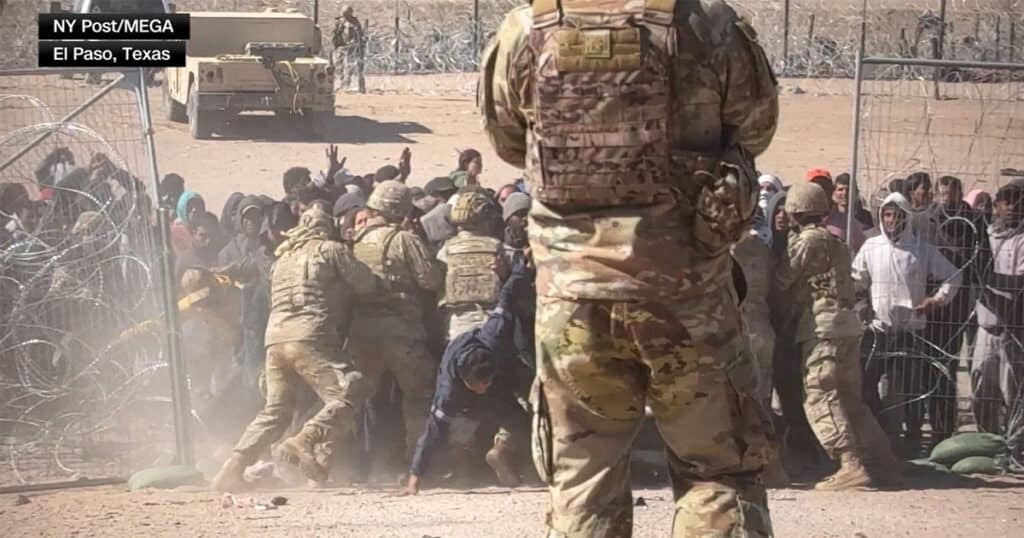
CBP: More than 241,000 illegal entries in May, 2.2 million in fiscal year
More than 241,000 people were apprehended after illegally entering the U.S. in May, according to newly released data from U.S. Customs and Border Protection.
May’s numbers push the total number of apprehensions and encounters of illegal border crossers to more than 2.2 million in the first eight months of fiscal 2024.
Last month, the majority of illegal entries occurred at the southwest border of 170,723.
At the northern border, they totaled a record-breaking 18,644, the highest for the month in recorded history. The northern border has seen the highest number of illegal entries in U.S. history under the Biden administration, The Center Square has reported.
As is the case every month, the majority of apprehensions of illegal border crossers were of single adults. Last month, 148,944 single adults were apprehended, while 1.35 million were apprehended in the first eight months of fiscal 2024, according to the data.
The next greatest number of apprehensions were of individuals claiming to be in a family unit. They totaled 82,833 last month and 785,631 in fiscal 2024 through May.
Last month, CBP continued to advance parole programs created by Department of Homeland Security Secretary Alejandro Mayorkas designed to process and release foreign nationals into the country, surpassing records every month.
In May, more than 44,500 foreign nationals were processed using the CBP One app. Since DHS launched the app in January 2023, through May 2024, more than 636,600 foreign nationals “successfully scheduled appointments to present at ports of entry,” CBP said.
CBP also processed and released an unprecedented number of Cubans, Haitians, Nicaraguans and Venezuelans through Mayorkas’ newly created CHNV parole program. It prioritizes releasing into the country citizens from these four countries who are considered inadmissibles under current law and would otherwise be prohibited entry.
“Through the end of May 2024, about 462,100 Cubans, Haitians, Nicaraguans, and Venezuelans arrived lawfully on commercial flights and were granted parole under these processes,” CBP said.
Among them, approximately 100,500 Cubans, 193,400 Haitians, 87,800 Nicaraguans, and 113,400 Venezuelans “were vetted and authorized for travel.” Of those, 98,200 Cubans, 177,100 Haitians, 80,700 Nicaraguans, and 106,100 Venezuelans were granted parole and released into the country, CBP said.
Multiple states have sued to stop Mayorkas’ parole programs, arguing they are illegal. The U.S. House Committee on Homeland Security also identified them as illegal and included them in the charges brought against Mayorkas for which he was impeached in February.
The committee’s chairman, U.S. Rep. Mark Green, R-Tenn., argues the May numbers are as high as they are because the “illegal” parole programs are being used.
Apprehensions and encounters at ports of entry “remain at historic levels, because Biden and Mayorkas have implemented unlawful policies like the CBP One and CHNV mass-parole schemes,” he said. “Encouraging inadmissible aliens to show up at the ports of entry instead of between them might be better optics for the Biden administration, but the outcome is the same – hundreds of thousands being processed and released into our country at unprecedented rates.”
“Meanwhile, CBP continues to be directed to release individuals into our communities, only to later learn of terrorist connections missed in the vetting process,” he said.
DHS Inspector General audits have found that Border Patrol, CBP, Immigration and Customs Enforcement and other agencies aren’t properly vetting illegal border crossers at ports of entry and at airports and are releasing known or suspected terrorists into the country.
Green also took aim at the president’s latest so-called amnesty plan, which The Center Square reported would usher in another two million illegal border crossers.
Biden’s plan will “doing nothing to stem the tide,” Green said. “There’s no end in sight to this disaster under the current administration and its policies.”
When releasing the CBP data, Troy Miller, a senior CBP official, said, “In close coordination with U.S. and foreign partners, CBP continues to take strong enforcement efforts against transnational criminal organizations at our borders and beyond. Our enforcement efforts are continuing to reduce southwest border encounters. But the fact remains that our immigration system is not resourced for what we are seeing.”
Green and others in the House have pushed back against this argument, pointing out that the Biden administration cut funding for detention and removal programs and staffing. Congress increased CBP funding by $2.98 billion since fiscal 2021, The Center Square reported.



